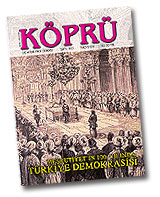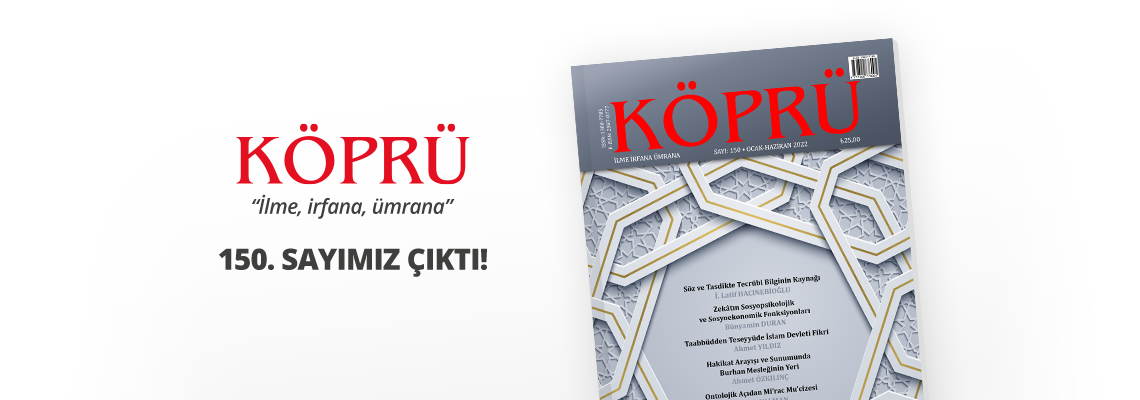Köprü Anasayfa

Meşrutiyet'in 100. yılında Türkiye Demokrasisi
"Yaz 2008" 103. Sayı
-
The Democracy Process of Turkey
Editorial
The discussion of the concepts as republic (constitution), democracy and liberty takes place within our political culture for 150 years. Nevertheless, we can not say that the accumulation about these concepts has reached a desired level. The personal, social, economic and political data display us that the connotations of these concepts can not find for themselves sufficient application areas during the days in which the declaration of the 2nd Constitutional period known as the declaration of “Liberty” reached its centenary. To delve into the roots of the sociological and political realities that are influential in this issue and to try to produce some solutions are the main sakes to widen the democracy culture. We, as the journal of “Köprü”, aim to draw our attention into this process; and also to contribute into our democracy culture. Furthermore, we want to understand the position of Bediüzzaman and Risale-i Nur within the democracy adventure of Turkey. Thus, we open the “Democracy Process of Turkey” into discussion around the concepts as “constitution, republic, democracy, democratization, liberty, etatism, authoritarianism, state of law, human rights, justice, European Union, civil society” in order to emphasize the issues below.
Some questions are: Discussing the “Democracy Process of Turkey” will bring about many questions to the front. What do the concepts like constitution, republic and democracy mean? How can we interpret the Constitutional and Republican periods during the founding process of our democracy, shortly? What are the basic problems and ruptures of Turkish democracy? How do we position ourselves within the democracy culture? What are the impediments against the establishment of human rights, democracy and judicial values in Turkey? What are the contributions of the Turkey-EU relations into our democracy? How do the authoritarian actions influence this process? What are the roles and effects of coup d’etats within the democratic process? What is the relationship between Islam and democracy? How can we consider the “state of law” understanding of our land within the Constitution and judicial applications through the human rights principles? What are the Bediüzzaman’s views on constitution, democratic state of law, equality, justice and liberty? What is the relationship between the civility of a society and its democratization?
The determinant state-centered codes which have been dominant during the transition of the state from empire to republic, the continuation of the authoritarian tendencies and the postponing of the individual rights and liberties are impeding factors against the maturation of our democracy. The right ways to overcome these barriers are also from the questions to be answered.
Bediüzzaman Said Nursi is a conspicuous person because of his original comments on the concepts like constitution-republic, democracy and liberty. His arguments he brought into the front in the discussions on the issue after the 2nd Constitutional Period avail us with some clues on the modern democracy.
Bediüzzaman Said Nursi builds up his idea of “democracy” upon three basic concepts of justice, council (parliament) and rule of law. However Nursi, brings some evidences for the democratization from the religious sources and tries to maintain it. He also reinforces the base of this phenomenon with the concepts of liberty, sovereignty of people and equality. His experience is a necessary experience to make these ideas wider among society.
Considering all of these, we made the dossier subject of our 103rd issue “The Democracy Process of Turkey” while taking the centenary of the Second Constitution into account. In this issue, you can read general democracy theories, the features of modern-libertarian democracy, the Bediüzzaman’s views on this issue, the relation of Council with the democracy, the peculiarities of the 2nd Constitutional period and its significance for our democracy. Besides, we published the papers of the panel “The Democracy Process of Turkey in the Centenary of 2nd Constitution” organized by the Institute for Risale-i Nur at the 30th of March, 2008. We hope that this issue will contribute to the democratization attempts. We can consider this issue as the attempt of a desire for a Turkey in which democracy, law, liberties, peace and human values would rule. While we leave you with the issue together, we hope to be able to meet you again in the next issue with the same subject.
-
Türkiye'nin Demokrasi Süreci
Editör
Yazıyı okumak için tıklayınız... -
The Democracy Process of Turkey
Editorial
Yazıyı okumak için tıklayınız... -
Meşrutiyet’ten Demokrasiye Bediüzzaman
Risale-i Nur Enstitüsü
Yazıyı okumak için tıklayınız... -
Siyasal Yönetim Biçimleri ve Demokrasi
Coşkun Can AKTAN
Yazıyı okumak için tıklayınız... -
Türkiye’de Demokrasi’nin Geleceği
Ali Murat YEL
Yazıyı okumak için tıklayınız... -
Nursi’de Devlet Algısı
Bünyamin DURAN
Yazıyı okumak için tıklayınız... -
Meşrutiyet’in 100. Yılında Türkiye’nin Demokrasi Serüveni
Mehmet ALTAN
Yazıyı okumak için tıklayınız... -
Meşrutiyet’in 100. Yılında Türkiye’nin Demokrasi Serüveni
Cengiz AKTAR
Yazıyı okumak için tıklayınız... -
Meşrutiyet’in 100. Yılında Türkiye’nin Demokrasi Serüveni
Kazım GÜLEÇYÜZ
Yazıyı okumak için tıklayınız... -
Meşrutiyet’in 100. Yılında Türkiye’nin Demokrasi Serüveni
Doğu ERGİL
Yazıyı okumak için tıklayınız... -
Meşrutiyet’in 100. Yılında Türkiye’nin Demokrasi Serüveni
Atilla YAYLA
Yazıyı okumak için tıklayınız... -
Adalet ve Özgürlük Bağlamında Türkiye’de Demokrasi
Reşat AÇIKGÖZ
Yazıyı okumak için tıklayınız... -
Demokrasi ve İnsan Hakları Bağlamında Hz. Peygamber’in (sav) Muhaliflere Karşı Tutumu
Musa Kazım YILMAZ
Yazıyı okumak için tıklayınız... -
Bazı Tefsirlere Göre Şûrâ ve Şûrâ’nın Demokrasi ile Mukayesesi
Atilla YARGICI
Yazıyı okumak için tıklayınız... -
Şûra İlkesi ve Demokrasiyle İlişkisi
Recep ARDOĞAN
Yazıyı okumak için tıklayınız... -
Hareket Ordusu
Nazmi EROĞLU
Yazıyı okumak için tıklayınız... -
“Cumhuriyet ki, adalet ve meşveret ve kanunda inhisar-ı kuvvetten ibarettir”
Bediüzzaman Said Nursi
Yazıyı okumak için tıklayınız...
